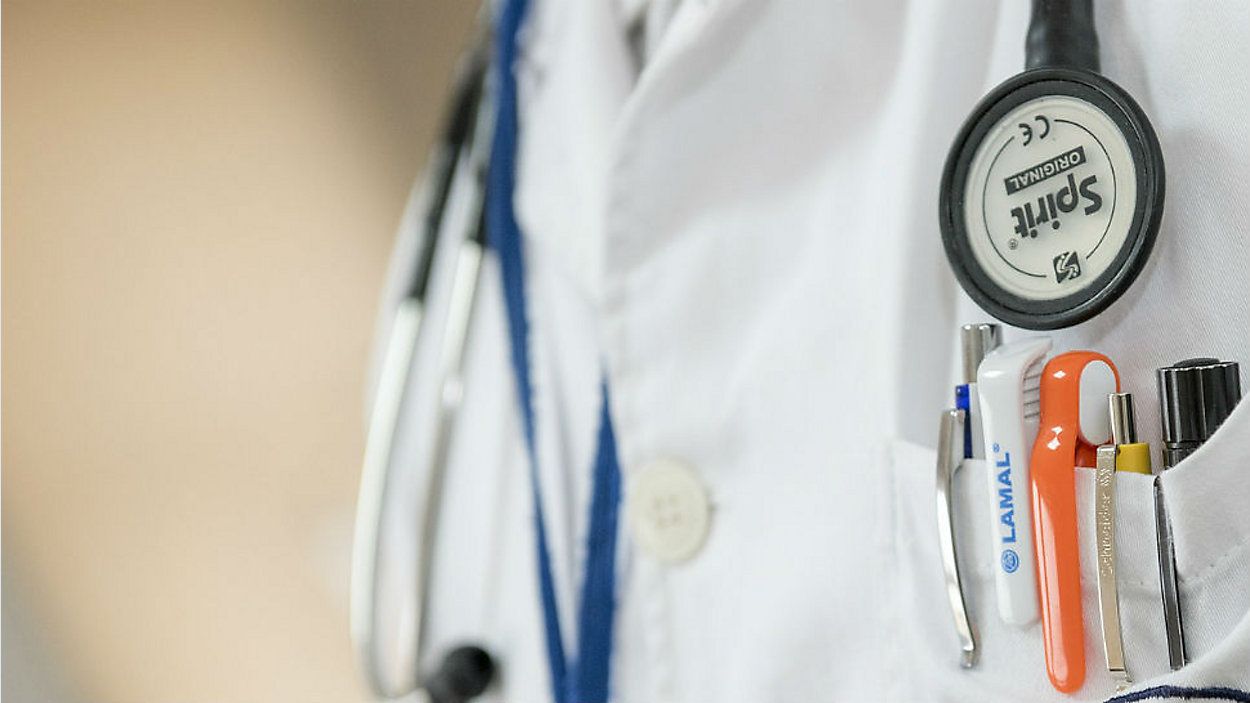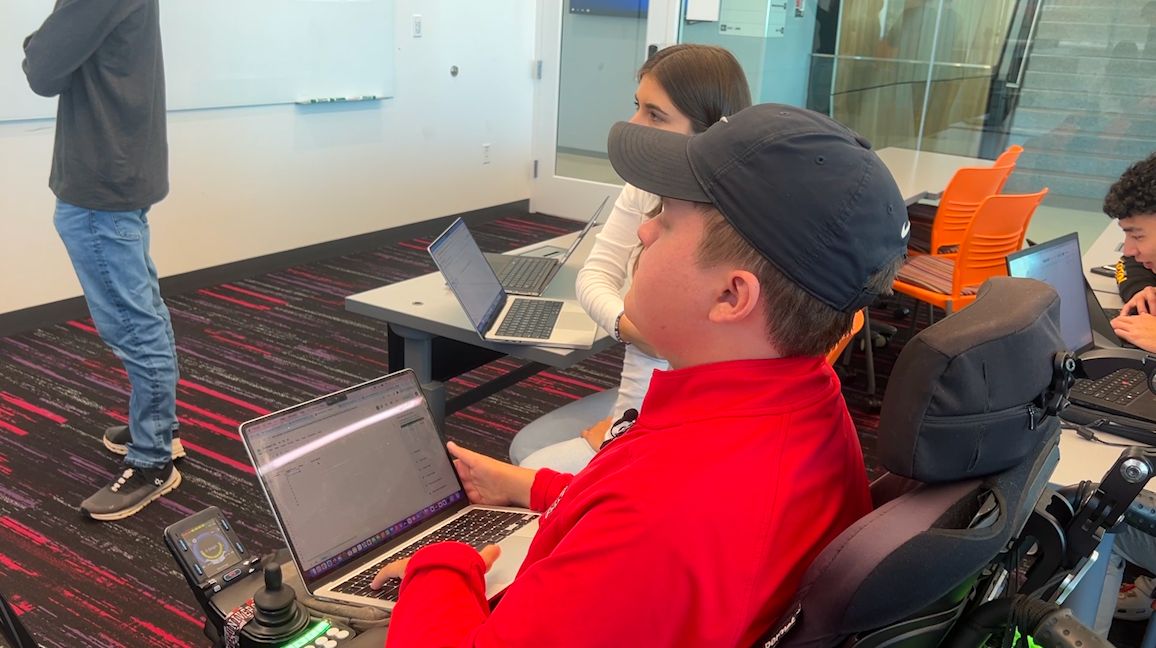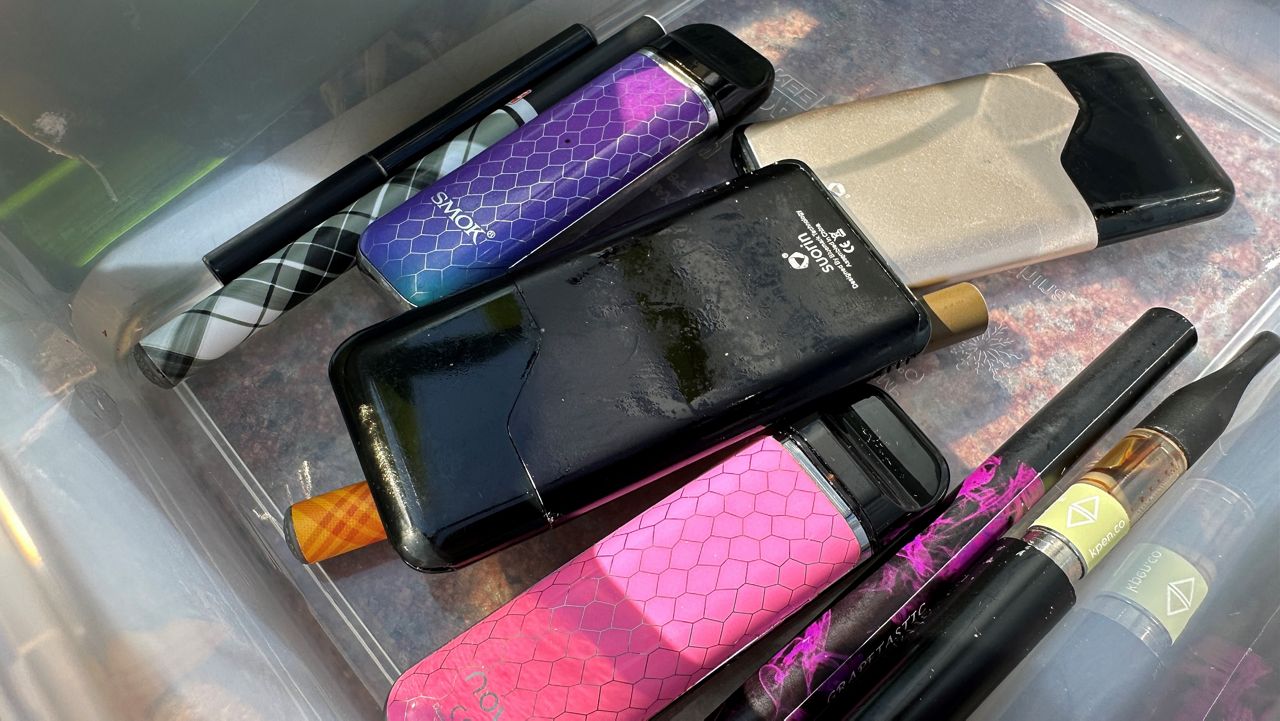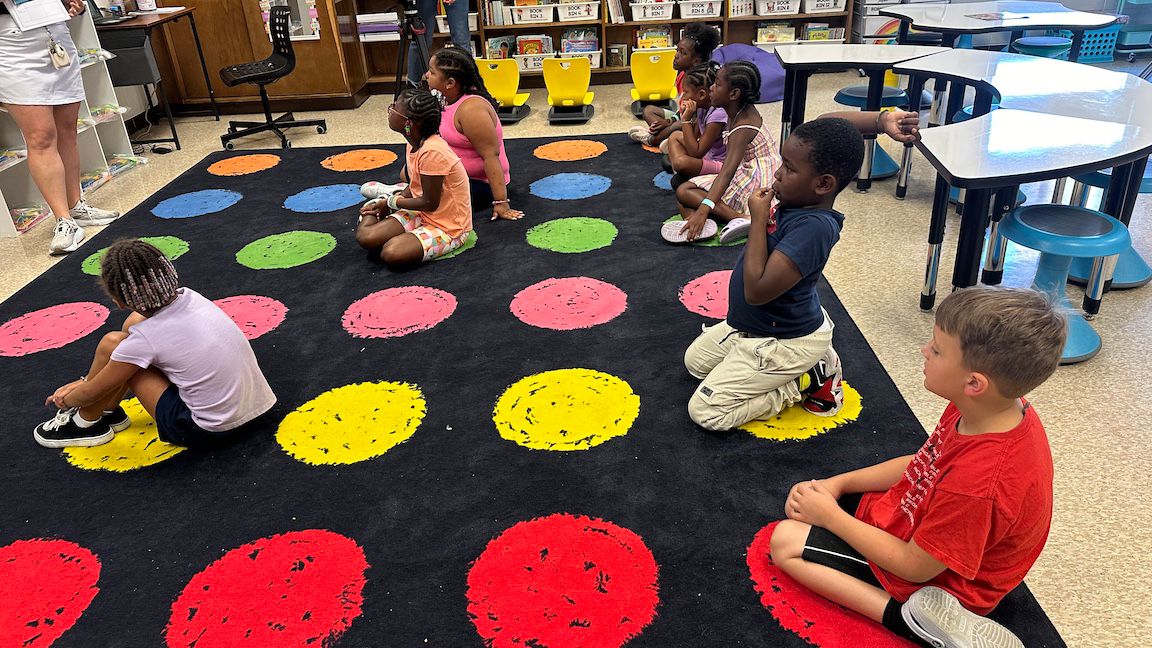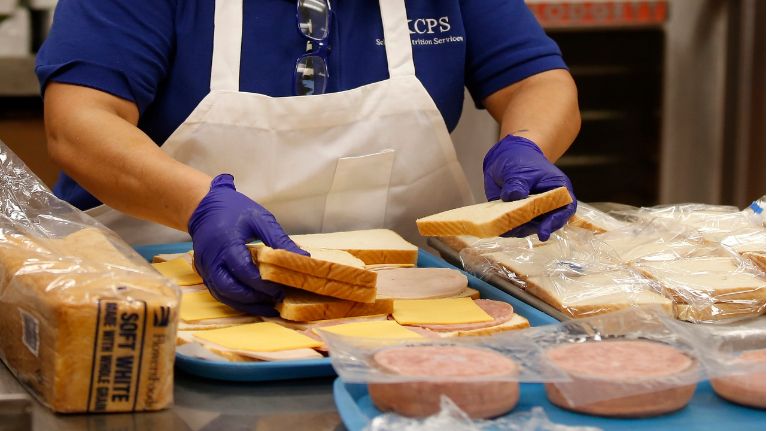GREENSBORO, N.C. (AP) — Peering into a girl's eye with a beam of light from her cellphone, Kim Gordon didn't find anything amiss. So the Cone Health nurse sent the Bessemer Elementary student back to class.
On a daily basis, schools call parents to get children who aren't feeling great, even sometimes when the issue is small or easily treatable. And Guilford County Schools leaders say traditional school nurses are often stretched too thin to help, splitting time between schools while juggling responsibilities such as tracking COVID-19 cases, managing lice outbreaks and conducting hearing and vision screenings.
That's where Gordon enters the picture. She is a nurse in a school — but she's not the school nurse.
Instead, Gordon is employed by Cone as part of a telehealth clinic program the medical provider is running in several district schools. She does quick checks on student health complaints, and, when needed, connects students with an off-site doctor for medication consultations or virtual exams.
The telehealth clinics are helping limit how much class students miss for medical issues, district leaders said. And that is fueling an appetite for expansion with the district and Cone aiming to have 51 clinics running in the next three or four years — all in schools with a high percentage of students from low-income families.
Many of those schools suffer from student attendance issues, leaders said, and parents often lack the job flexibility or transportation to get their children to a doctor's appointment on short notice.
"The goal is to prevent kids from missing critical instructional time for minor health concerns like an ear infection or sore throat," Superintendent Whitney Oakley said."The goal is to prevent kids from missing critical instructional time for minor health concerns like an ear infection or sore throat," Superintendent Whitney Oakley said.
What's telehealth? Think of it as medicine at a distance.
It's a way to see a doctor without having to schedule a traditional office visit because consultations can be done through a computer screen or smartphone.
The idea of telemedicine actually goes back years, but the practice became more widely known during the COVID-19 pandemic while many communities, especially those in rural areas, were in lockdown and needed a way to get convenient, immediate care.
Under the Cone telehealth model, each school gets to have a nurse or certified medical assistant on site each day. That person has a direct tie to doctors off campus. They can consult with physicians about medications and, when needed, hold a video call with a doctor and the student's parent.
Cone Health is then able to bill a student's insurance, often Medicaid, for the services. Thus far, philanthropic dollars have covered deductibles for students with other forms of insurance as well as costs for those without insurance.
Families must sign up for the program in order to participate.
"It helps me feel like my little one is in medically safe hands," said Christina Green, a parent at Bessemer whose child uses the clinic.
Cone Health's Dr. John Jenkins came up with the idea. Jenkins said he had been working on various digital health initiatives for Cone and starting to look into how the provider might make telehealth more inviting for low-income people.
Through research, he figured out that medical providers in other areas were seeing success offering telehealth through partnerships with schools.
"Cone's mission is broadening as a health care system to not only look at what we do within the walls of our hospitals and offices, but what can we do within the streets and homes and schools of our community to make a healthy population," he said.
At the moment, Bessemer, Cone, Union Hill and Washington Montessori are offering the telehealth clinics. The district and Cone Health aim to add 10 more schools for the 2023-24 academic year, a next step toward their goal of expanding to 51 elementary schools.
They expect to fund the expansion through a mix of private and public dollars, including a grant to Cone Health from Guilford County. Challenges ahead include raising the additional money needed and hiring enough staff as the program expands.
"We just have to get through these hard parts of implementation, but we have so much good will and everybody at the table at this moment saying this is exactly what can make a big difference in outcomes for kids," said Winston McGregor, president of the Guilford Education Alliance, which is helping to seek and coordinate philanthropy for the project.
McGregor said that both nurses and CMAs are in high demand and hard to hire, but she expects it to be easier to find CMAs than nurses.
Jenkins said Cone is partnering with agencies like the United Way and local schools to work on identifying parents and others who would be interested in participating in a CMA training program. The telehealth clinic jobs could be a great fit for a parent, he explained, because the hours match their child's school hours.
McGregor said it will take an estimated $5 million in philanthropic giving to cover additional startup costs to bring the program to the other elementary schools. However, she said the program has applied for a grant that could potentially cover much of that remaining cost.
The philanthropic donations would be in addition to the $2.2 million in funding that county commissioners approved in a grant to Cone Health in October using federal COVID-19 relief dollars. And Oakley said Guilford County Schools has also set aside up to $1.5 million in federal Title I dollars that could be used if needed this year, depending on what's covered by other sources.
It's money which can be used for a variety of purposes in "Title I" schools, which have a high percentage of families with low-incomes — and it could be a recurring source of funding in the future.
School board members had generally positive responses to a presentation about the telehealth clinics this past spring. But Michael Logan, the Republican nominee to fill the school board seat vacated by Pat Tillman, has voiced an alternate perspective.
"It's a wonderful thing for Cone Health to want to do that, but it should be done outside of the schools," Logan said. "The schools' job is to educate kids and that should be the primary focus of the schools."
The Cone Telehealth Clinic at Bessemer Elementary started in 2021, with funding from the Duke Endowment and is the flagship of the program.
As of this past spring, out of 300 patients seen at the Bessemer clinic since it opened, 240 were able to return to class afterward. Most of the school's families have signed up for the program.
Principal Jonathan Brooks is a Bessemer alumni, who had previously been working in Durham. He said the new clinic was a major factor in attracting him. Any child can have health issues or concerns, but he said schools that serve a lot of students from low-income families tend to see extra challenges related to student health.
"Sometimes things that would be quickly resolved in other communities linger in our community," he said.
He said the program is helping a lot of students miss a little less school and making a big difference for a small number of kids with chronic conditions.
Green's daughter, Kaleesi, falls in that category.
Green said her daughter, who has ongoing health issues, missed about a week's worth of school at the beginning of the year. Kaleesi suffered first from a massive migraine, then from more minor headaches that could have been treated with ibuprofen. Teachers, Green said, couldn't tell the difference.
Now that the family is signed up for the telehealth program, Green said, Kaleesi knows she can go to see Gordon, the Cone Health nurse, if she isn't feeling well — and that's helping cut down on how much school she is missing.
Twice, she said, she's participated in telehealth medical appointments through the school clinic, such as when Kaleesi had a sore throat. Over the three-way video call, Green and the doctor watched as Gordon used a device to show them the inside of Kaleesi's throat and listened as the nurse used an electronic stethoscope.
"We could all pretty much hear her heartbeat and heart rates," Green said.
Gordon's a veteran nurse who said she values being able to help low-income families.
"Parents try, but they just don't have a lot," she said. "Whatever I can do to make a difference, it makes me feel good."
Gordon said she sees about 15 to 20 students per day, consulting daily with doctors on medications for them. She says she's held full-scale telehealth exams with doctors, children and their parents maybe once or more per month.
A child might go back to class with an over-the-counter pain medication, which can be offered through the clinic. Or the doctor might call in a prescription that their parents can pick up at a local pharmacy.
At Bessemer, Gordon's seen everything from seizures and heat stroke to pneumonia. But it's the little things that make up much of the day-to-day work.
The impact that she and the clinic are making become clear on a day when she's somewhere else.
"When I am not here, they will have six or seven kids go home," she said. "If I was here, they wouldn't have to go home."



